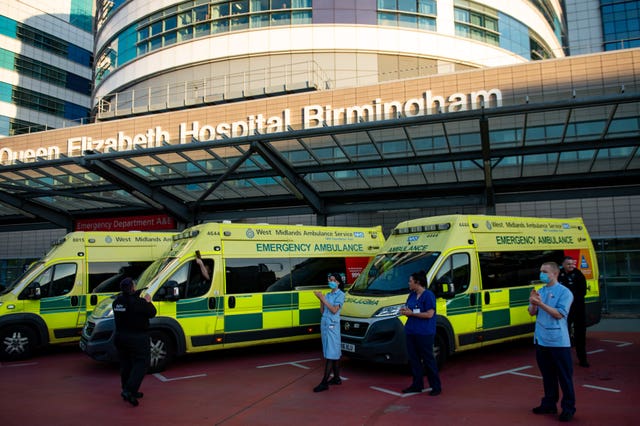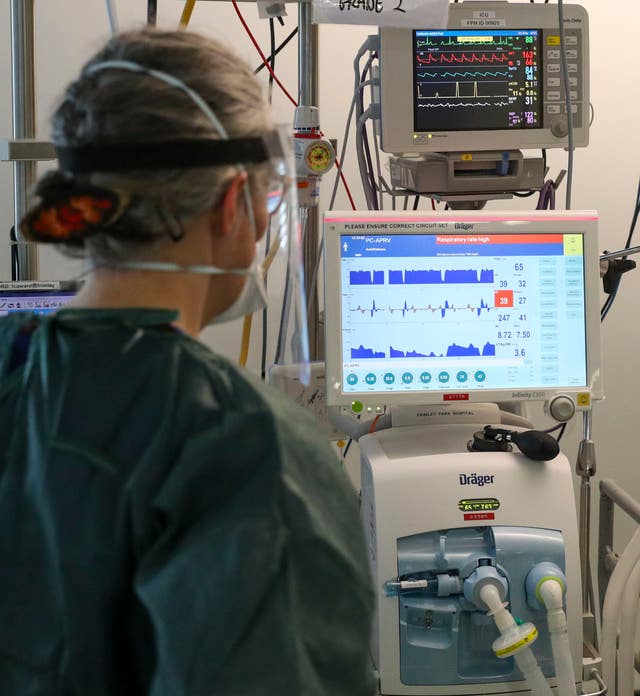No ITU Covid-19 patients in England’s biggest hospital trust, says Birmingham health chief
Coronavirus-infected patients also ‘don’t seem as sick, on average, as they were’ says trust chief executive.
There are no Covid-19 patients in intensive care at England’s largest hospital trust for the first time since the pandemic began, its chief executive has said.
Dr David Rosser, who heads the University Hospitals Birmingham NHS Foundation Trust (UHB), also said there were signs coronavirus-infected patients “don’t seem as sick, on average, as they were”.
Speaking on a webinar with regional journalists on Friday, he said the trust had lost 30% of its normal treatment capacity for ordinary services having to cope with Covid-19.
Dr Rosser also said Apple and Google were “disgraceful” for not doing more to ensure the now-scrapped NHS contact tracing app could work across both firm’s operating platforms.
The West Midlands has been among the hardest hit regions in the country by the virus, with 4,735 dying after testing positive for Covid-19.
The latest NHS figures released on Friday showed 943 people had died with the virus at the UHB trust which runs four hospitals including Birmingham’s vast Queen Elizabeth Hospital.
Dr Rosser said there were now just 43 “active-Covid” patients in treatment across the trust.
Another 140 were described as “in prolonged recovery”.
At one stage, during the peak of the pandemic in April, the trust had about 100 patients alone on ventilators.
But Dr Rosser said the number of new cases having been admitted was down to “less than double figures” in the last few days.
He added: “We actually have no Covid-19 positive patients in the ITUs (intensive treatment units) at all at the moment which is the first time since the beginning of the pandemic.
“In the region, that’s the first time, that’s good.”
He added there could be signs the virus may be weakening, although cautioning patient numbers were so small it could be a “coincidence”.
Dr Rosser said: “At the peak of the pandemic, for every 43 patients we had in the hospital we had about 10 patients in the ITU.

“So it’s interesting in that we’ve got 40-odd patients with active Covid in the hospital and none of them need intensive care.
“I don’t think we understand or have the insights into what that is about, but it’s interesting how current patients don’t seem as sick, on average, as they were.
“That may be just a coincidence – it’s all very small numbers.”
Turning to the longer-term knock-on effects on “ordinary services”, he said getting back to full capacity would be “extremely difficult”.
He said: “The NHS’s capacity was stretched slightly beyond its limits.
“We lost pretty much 30% of our capacity by changes we have had to make to make patients and staff safe.
“There’s a lot of things we were doing before, that we simply don’t have capacity to do at the moment.”
He added that “prioritisation” meant there were “some pretty unpleasant decisions” having to be made on what services can be offered and to whom.
“We are not going to be in a position where we are going to be able say for the next 18 months we are going to have five orthopaedic theatres and three general surgery theatres,” he said.

“We’re going to have to make sure all our resources are as flexible as possible.”
Asked if the Government could have handled its development of a track and trace app better, Dr Rosser said “big tech” firms Apple and Google had much to answer for.
He said it was “disgraceful” they “won’t work together”.
Dr Rosser said: “My understanding – and I deal quite a lot in the digital health space – of the fundamental reason the app won’t work is the big tech companies won’t share platforms.
“I think that’s a pretty disgraceful position to be honest.
“My understanding is you can get it (the NHS app) to work on an Apple platform or an Android platform.
“But because those two big companies won’t work together, you can’t look at anything that will work across those platforms.
“Frankly I find it slightly difficult to blame the Government for that.”
He added: “I think the tech companies should be pretty profoundly ashamed of themselves, is my personal view on that.”
A temporary Covid-19 mortuary built at Birmingham Airport with capacity for up to 12,000 bodies is to be mothballed, with its longer-term future to be revisited in early 2021.





